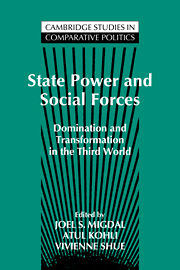Book contents
- Frontmatter
- Contents
- Preface
- List of contributors
- State Power and Social Forces
- Introduction: developing a state-in-society perspective
- PART I THEORETICAL AND METHODOLOGICAL CONSIDERATIONS
- PART II STATES: EMBEDDED IN SOCIETY
- PART III SOCIAL FORCES: ENGAGED WITH STATE POWER
- 6 Labor divided: sources of state formation in modern China
- 7 Business conflict, collaboration, and privilege in interwar Egypt
- 8 A time and a place for the nonstate: social change in the Ottoman Empire during the “long nineteenth century”
- 9 Peasant–state relations in postcolonial Africa: patterns of engagement and disengagement
- 10 Engaging the state: associational life in sub-Saharan Africa
- PART IV CONCLUSION
- Index
9 - Peasant–state relations in postcolonial Africa: patterns of engagement and disengagement
Published online by Cambridge University Press: 05 June 2012
- Frontmatter
- Contents
- Preface
- List of contributors
- State Power and Social Forces
- Introduction: developing a state-in-society perspective
- PART I THEORETICAL AND METHODOLOGICAL CONSIDERATIONS
- PART II STATES: EMBEDDED IN SOCIETY
- PART III SOCIAL FORCES: ENGAGED WITH STATE POWER
- 6 Labor divided: sources of state formation in modern China
- 7 Business conflict, collaboration, and privilege in interwar Egypt
- 8 A time and a place for the nonstate: social change in the Ottoman Empire during the “long nineteenth century”
- 9 Peasant–state relations in postcolonial Africa: patterns of engagement and disengagement
- 10 Engaging the state: associational life in sub-Saharan Africa
- PART IV CONCLUSION
- Index
Summary
INTRODUCTION
At the heart of the contemporary crisis in sub-Saharan Africa lies a deep estrangement between state and society. State elites and peasant producers – arguably the two most politically relevant categories of social actor in Africa – have yet to engage each other fully in a mutually advantageous project of national development. To date, these groups have not arrived at a working consensus to reconcile the quest by state elites for political survival with the aspirations of ordinary Africans for economic well-being.
The essence of the postcolonial history of sub-Saharan Africa is therefore an unresolved political struggle: On one hand, political elites wish to extend the authority of the state over scattered populations, most of whom live in rural areas; on the other hand, peasants remain determined to preserve a realm of authority within which to make decisions about their own lives. The struggle between these groups centers on the classic issue of early modern economic development: Who will produce and who will dispose of economic surpluses from agriculture, and on what terms?
The argument presented here is that a state–peasant struggle persists in African countries because neither party has the power resources to resolve it. Both state and peasant organizations are more effective at asserting political autonomy than they are at building political capacity. Neither has succeeded in capturing the other. Thus the upshot of their interactions more commonly has been reciprocal political disengagement rather than joint engagement in a concerted effort to reach shared goals.
- Type
- Chapter
- Information
- State Power and Social ForcesDomination and Transformation in the Third World, pp. 231 - 254Publisher: Cambridge University PressPrint publication year: 1994
- 12
- Cited by

